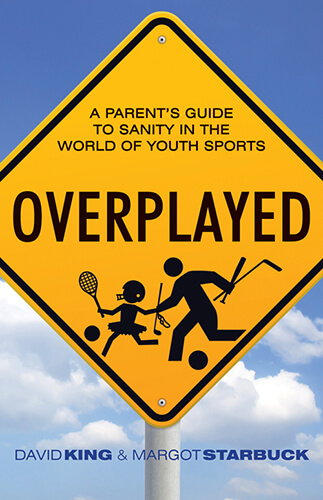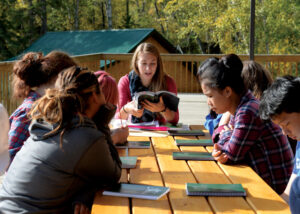We just dipped our toe into the world of youth sports by signing our seven-year-old son, Sam, up for a T-ball team. Last summer he discovered a love for baseball and loves playing in the backyard with his little sister and my husband. He even sleeps with his baseball glove, so joining a team seemed like the next logical step.
After reading Overplayed: A Parent’s Guide to Sanity in the World of Youth Sports, however, I am going into this experience with my eyes wide open.
In Overplayed, authors David King and Margot Starbuck look at seven myths surrounding youth sports and how sports affect family involvement in their church and local communities. King, a university athletic director, has worked in the world of sports and education for 35 years, and Starbuck is an author with three children who have been involved in sports. They know what they are talking about and, in my opinion, provide a balanced perspective.
The myths King and Starbuck look at are:
- Because we owe our child every opportunity, we can’t say no to youth sports;
- My child deserves to play with the most-skilled athletes;
- My child should specialize in one sport;
- There’s no harm in participating in youth sports;
- Youth sports instill our family’s values;
- Good parents attend all their children’s games; and
- The money we are investing into youth sports will pay off.
In unpacking these seven myths the authors offer sound advice, provide good questions to ask ourselves and our children, and give families permission to not get caught up in the world of youth sports solely because we believe these seven myths.
They don’t only point fingers at the people behind youth sports organizations, but also make us take a hard look at ourselves as parents to see what kind of pressure, either intentional or unintentional, we put on our children.
Although the authors provide sound ideas on how to live out our faith in the world of sports, I would have liked to see a little more discussion about the impact of sports involvement on faith. To its credit, Herald Press provides a study guide that I would love to use in a Sunday school class sometime.
As a Canadian reader, I felt like some of the ideas in this book are for an American audience. I’m not sure that the goal of achieving an athletic scholarship to help pay for university is at the forefront of many Canadian parents’ minds, for instance. King and Starbuck do acknowledge the American focus of the book, although they provide a brief note about hockey in Canada that was so spot on it made me cringe. In general, though, there is a lot of good advice for any family with children involved in organized sports, no matter the nationality.
After reading Overplayed, I am confident that our decision about Sam and T-ball is a good one for our family, for now. However, I am going to be very aware of how my behaviour will affect his enjoyment of the game. And, taking King and Starbuck’s advice, I might even miss a few of his games to read a good book!







Leave a Reply
You must be logged in to post a comment.